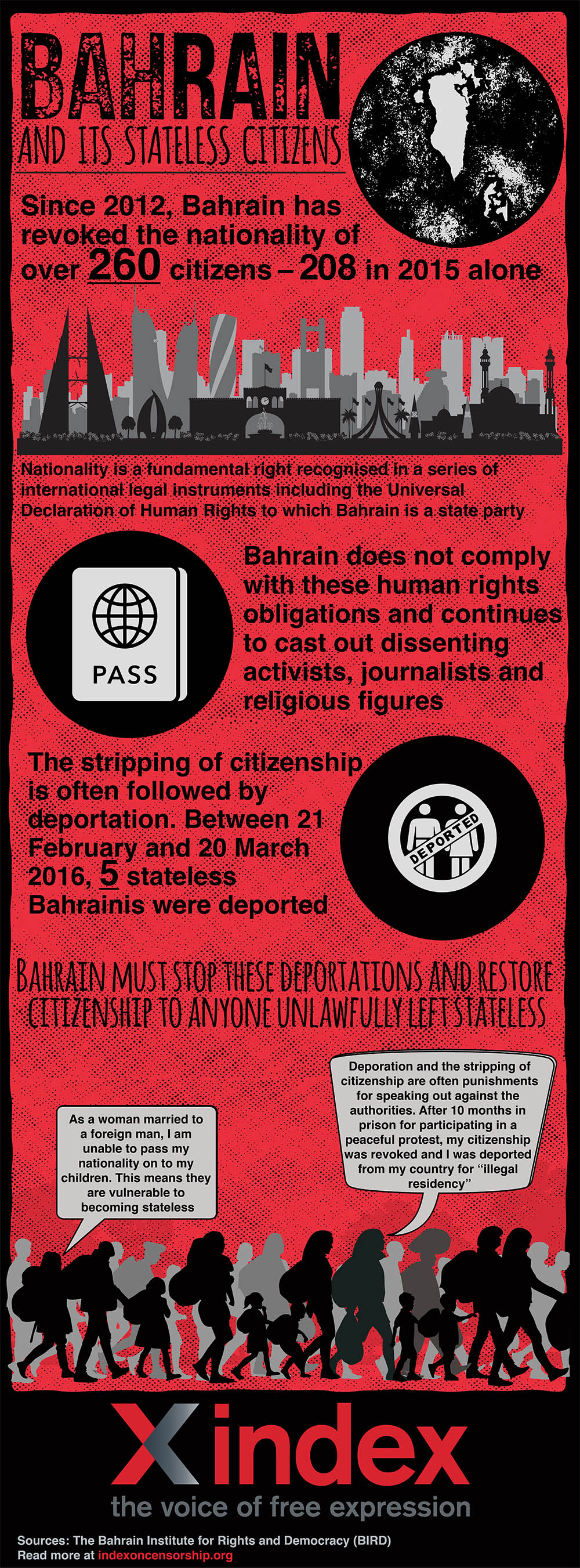Bahrain: critics and dissidents still face twin threat of statelessness and deportation

When we read about displaced people in the press, we usually hear about Syrian refugees fleeing IS or the one person per second displaced by natural disasters. We are less likely to be made aware of those who have become stateless through forced displacement.
Nationality is something most of us take for granted, but for the 10 million people worldwide who are effectively stateless, the issue is much less trivial.
Bahrain, in particular, has intensified the use of stripping citizenship from those who dissent or speak out in protest as a form of punishment. Since 2012 – when the country’s minister of the interior made 31 political activists stateless, many of whom were living in exile – 260 citizens have fallen victim, 208 in 2015 alone. Eleven juveniles, at least two of which have received life sentences, and 30 students are known to be among them.
Nationality is a fundamental right recognised in a series of international legal instruments, including the Universal Declaration of Human Rights and the International Covenant on Civil and Political Rights to which Bahrain is a signatory. The country repeatedly fails to comply with these obligations.
In 2014, new amendments to the country’s 1963 citizenship law further increased the power of the ministry of the interior and gave judges the authority to make anyone convicted under Bahrain’s anti-terrorism act, which fails to properly define terrorism, stateless.
In the case of Sayed Alwadaei, director of advocacy at the Bahraini Institute for Rights and Democracy (BIRD) and 71 others who were deprived of citizenship in January 2015, their “crimes” included vague terms such as “inciting and advocating regime change” to “defaming brotherly countries”.
Speaking to Index on Censorship, Alwadaei said: “Bahrain is setting up a dangerous precedent. No state has rendered as many of its citizens stateless in 2015. These revocations are politically motivated, and are becoming more common because they got away with it in 2012.”
“I was targeted because of my activism, and Bahrain considers human rights advocates as terrorists,” he added. “As I was not inside the country to face imprisonment, my nationality was the only way they could inflict pain on me. It was used as a tool to cause the maximum damage to stop my human rights work.”
While Alwadaei has not let the authorities take his identity, it does mean he is now stateless. “For my family, it means my infant son can’t have Bahraini citizenship, although his mother is also Bahraini.”
The danger for those made stateless inside Bahrain’s borders is that they do not have access to jobs, schools or health care and their bank accounts are closed, Alwadaei explains. “The people revoked of citizenship are at high risk of deportation by the court; many already have been under charges of ‘illegal residency’.”
These instances are also increasing. Between 21 February and 20 March 2016, five stateless Bahrainis were deported. One of these was Hussain Khairallah, whose citizenship had been revoked since 2012. He had been a union organiser and one of the medics who treated wounded protesters during the Bahrain’s Bloody Thursday in February 2011 when security forces launched a pre-dawn raid to clear a protest camp at Pearl Roundabout in Manama.
Hussain Khairallah who I tweeted about has been deported by force by the #Bahrain regime from his country, rendered stateless
— Maryam Alkhawaja (@MARYAMALKHAWAJA) February 25, 2016
Anyone speaking out against the authorities faces such risks.
Overheard guards saying they are going to deport me. They keep saying I am not a citizen, but won’t show me any documents to that effect.
— Maryam Alkhawaja (@MARYAMALKHAWAJA) August 29, 2014
These practices and threats should immediately cease and all those who have fallen victim should have their citizenship restored. It is their right.

